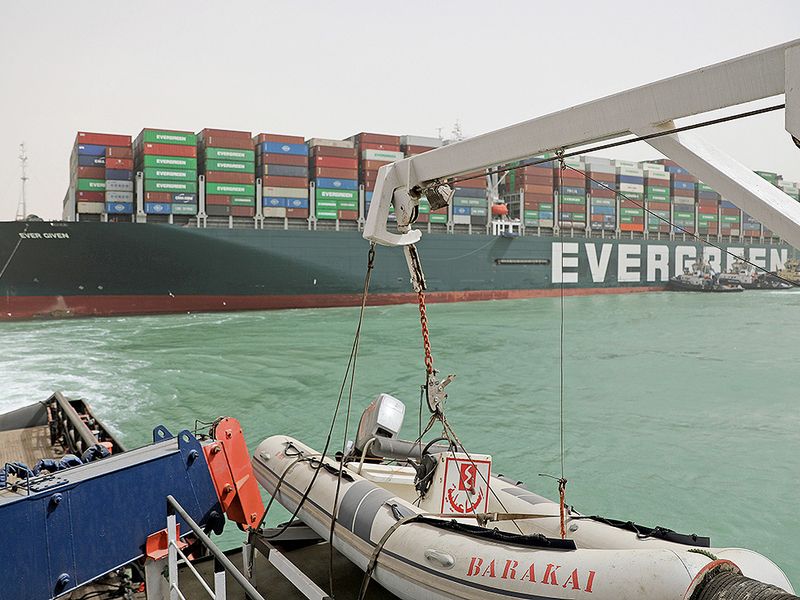
What else can possibly go wrong in the global auto industry supply chain?
A massive container ship became stuck sideways in the busy Suez Canal last week, the latest symbol of a supply chain stretched to its limits as additional assembly lines shut down because of an unabating worldwide shortage of microchips.
The mishap now combines with a global shortage of shipping containers, U.S. port congestion and a March 19 fire at the vital Renesas Electronics semiconductor factory in Naka, Japan, to increase the pressure on U.S. vehicle inventories. Honda, Nissan and Toyota said last week they were assessing what effect the shutdown of the Renesas plant would have on their production.
The Suez Canal may be half a world away, but the impact will be felt on the U.S. auto industry, warned Mark Fulthorpe, executive director of global light-vehicle production forecast at IHS Markit.
The blockage of the canal — a vital logistics link between Asia and Europe — by the enormous Taiwanese vessel Ever Given, left dozens of cargo ships and several vehicle carriers stuck on both sides of the waterway.
“The Suez situation will add to the burden faced by the industry,” Fulthorpe told Automotive News. IHS was already predicting a potential output loss of 1.2 million vehicles globally in the first quarter because of supply constraints — mostly as a result of the worldwide shortage of microchips.
The industry was holding out hope that April would mark the peak of industry disruption, followed by a gradual normalization of supplies in the third quarter, Fulthorpe said.
That timeline was disrupted by storms in the U.S., particularly a historically bad one across Texas that further crimped the flow of both semiconductor chips and petrochemical-based materials, such as coatings and resins, Fulthorpe said.
The combination of problems has darkened the outlook for vehicle production, even as U.S. demand surges for light vehicles despite inventory challenges and higher transaction prices. So far, sales in the first quarter are holding up, analysts said in their March sales forecasts.
“The broader question is how much more can we take” on the supply-chain side, asked Tyson Jominy, vice president of the Power Information Network at J.D. Power. “It started with the coronavirus and it’s moved on to computer chips. And we’ve got resin, and the Suez Canal, and who knows where it’s going to end and what the next one’s going to be?”
Lloyd’s List, a closely watched shipping publication, said that 165 vessels were affected by the Suez blockage last week, including eight vehicle carriers. The ship could keep the canal closed for weeks. Ships can choose alternate routes to the canal, but that adds several days of travel and significant fuel costs to their deliveries.
Images of the Ever Given, stacked with 20,000 colorful containers, generated endless social media memes about the overall disruption to normal life a year into the coronavirus pandemic. But for the auto industry, the bigger picture remains getting parts supply and vehicle demand in balance.
The shipping industry was already facing capacity limits and traffic delays because of heavy demand for consumer goods such as electronics. The Port of Los Angeles reported the busiest February in its 114-year history given surging imports, including such auto parts as tires, the port said.
Separately, industry officials in Canada warned last week that the movement of vehicles and parts through the Port of Montreal could soon be disrupted by a possible dockworkers’ strike there. That port processed 456,650 metric tons of vehicles and accessories in 2020, according to data from the port. Longshoremen at the port are demanding better work schedules.
But it was the world’s microchip shortage that had immediate repercussions on factory schedules last week. Some automakers made additional North America production cuts:
- Ford said it would idle production of the bestselling F-150 pickup at is plant in Dearborn, Mich., from Thursday to Sunday of last week. Ford previously said it would build its full-size pickups but hold them while waiting for the electronics modules they need.
- General Motors said it will idle its plant in Wentzville, Mo., between Monday, March 29, and Monday, April 5, and extend a plant suspension in Lansing, Mich., by two weeks. Affected vehicles, according to Reuters, include the Chevrolet Colorado and GMC Canyon midsize pickups.
- After halting output at its North American plants last week, Honda said some suspensions will continue this week. “Since this is a fluid situation that requires flexibility, the timing and length of production adjustments could change,” the company said in an email.
- Hyundai Motor America said that its Montgomery, Ala., plant would maintain regular production. The Korean automaker recently added its bestselling global vehicle, the Tucson compact crossover, to the plant and intends to add a small pickup soon.
But the outlook is now unclear. Parent company Hyundai Motor Co. played down a report last week that it could face curbs to production in April in the wake of the Renesas plant fire.
“We are closely monitoring the situation to take prompt and necessary measures and optimize production in line with the supply conditions,” Hyundai said in a statement.
That could mean building more popular models, such as crossovers, while relying on existing inventories of slower-selling sedans. Market analysts have said that several automakers are having to pick and choose what to build based on chip supply and inventories.
There’s enough overlap in the crossover lineups at most auto brands that a consumer can move up or down a segment with relative ease, Jominy said. The same goes for midsize vs. full-size pickups in many cases. Some sales are lost, but the market overall is strong.
“We’re up 5 percent in retail through February and we’re going to add another couple percent of growth here in March, so consumers and dealers are finding ways to offset whatever customers are looking for,” Jominy said. “They’re going home in vehicles.”
Bloomberg contributed to this report.